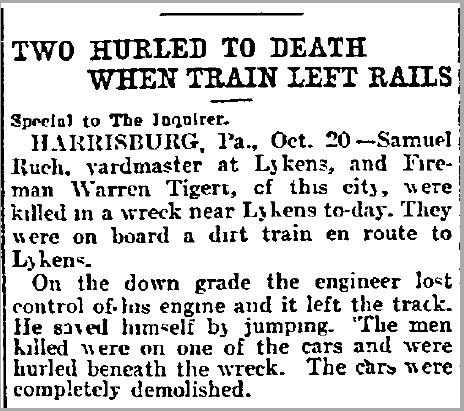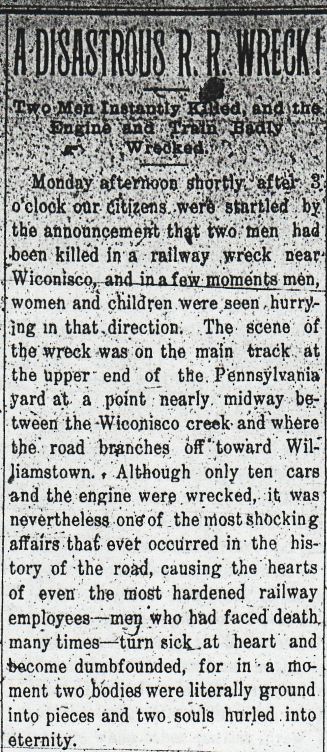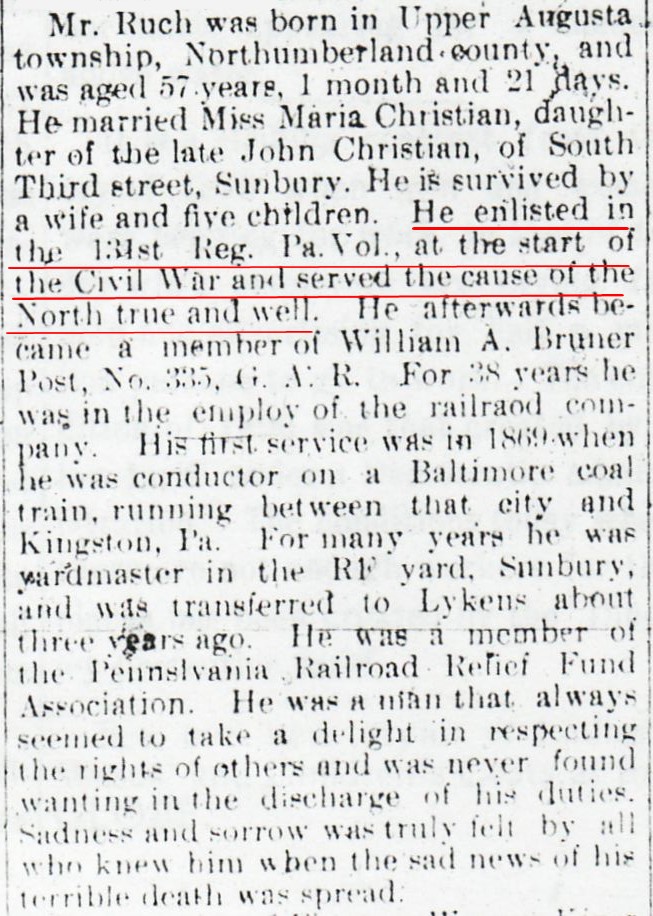Veteran Killed in Railroad Wreck
Posted By Norman Gasbarro on October 30, 2011
A Civil War veteran, Samuel Ruch (1846-1902), a resident of Lykens Borough, Dauphin County, Pennsylvania, was killed on 20 October 1902 in a terrible train wreck that happened near the railroad yard at Wiconisco where Samuel Ruch was the yardmaster. He was accompanying the crew of an engine when control was lost and the train began moving at about 75 miles an hour. Unable to brake the runaway train, it finally stopped when it plunged over an embankment, instantly killing the fireman and the yardmaster. The reports of the wreck reached the Philadelphia Inquirer which briefly described the incident as follows:
TWO HURLED TO DEATH WHEN TRAIN LEFT RAILS
HARRISBURG, Pa. – October 20 – Samuel Ruch, yardmaster at Lykens, and Fireman Warren Tigert, of this city, were killed in a wreck near Lykens today. They were on board a dirt train enroute to Lykens.
On the down grade the engineer lost control of his engine and it left the track. He saved himself by jumping. The men killed were on one of the cars and were hurled beneath the wreck. The cars were completely demolished.
The Lykens Standard of 24 October 1902 spared its readers none of the gruesome details of the tragedy including descriptions of the dismemberment of the bodies. Some of the detail in the story has been left out in this blog post in respect to the victims. A copy of the full, un-edited story can be found in the files of Gratz Historical Society.
A DISASTROUS R.R. WRECK
Two Men Instantly Killed and the Engine and Train Badly Wrecked
LYKENS, 24 October 1902 — Monday afternoon after 3 o’clock our citizens were startled by the announcement that two men had been killed in a railway wreck near Wiconisco, and in a few moments men, women, and children were seen hurrying in that direction. The scene of the wreck was on the main track at the upper end of the Pennsylvania yard at a point midway between the Wiconisco Creek and where the road branches off toward Williamstown. Although only ten cars and the engine were wrecked, it was nevertheless one of the most shocking affairs that ever occurred in the history of the road, causing the hearts of even the most hardened railway employees – men who had faced death many times – turn sick at heart and become dumbfounded, for in a moment two bodies were literally ground into pieces and two souls hurried into eternity.
The ill-fated train consisted of N.C. [Northern Central] engine No. 1803, two box cars and eight coal cars loaded with dirt, and was manned by the following crew: Engineer John H. Fox of Sunbury; Fireman Warren E. Kiger of Harrisburg; Conductor William Wetzel of Sunbury; Front Brakeman L. Bachman of Sunbury; Middle Brakeman L. L. Sturtevant, Sunbury; Flagman William Ganster, Sunbury.
The train is what is locally known as the Harrisburg coal train, as it brings the empty cars here when the collieries are working and takes the loaded ones away. On Monday they went to Williamstown for the two box cars and the cars loaded with dirt by the N. C. R. R. [Northern Central Railroad] steam scoop now located at the culm banks at that place. Yardmaster Samuel Ruch accompanied the crew to watch the workings of the scoop. When the train left Williamstown an unknown man of the steam scoop gang got on the caboose, making nine men aboard. The engine was turned tender front. The distance from this place to Williamstown is five miles and the about 110 feet to the mile and it requires great care on the part of the engineer and his crew to prevent a runaway. The train started gradually but soon the speed was greatly increased. The engineer reversed his engine applied the air and opened the sand valve, but the train could not be checked and on it dashed to its doom, traveling at the rate of about 75 miles an hour. Residents of Wiconisco say when it passed through that place it appeared as if there was but one car, and shortly afterward they heard a crash.
To the fact that the tender was in front is no doubt due the wreck at this point, as the great speed at which the train was traveling caused it to sway from side to side until it left the rails, throwing the engine down the east embankment and piling up the following cars in a mass of debris. Engineer Fox stuck to his post and when the engine rolled over on its side was thrown on the boiler and then from some unknown force in the rear pushed it over, when he crawled out of the cab. he then shut off the steam, while other parties drew the fire. Fox, who escaped with a slight injury of the right leg, then looked around for his fireman, Warren E. Kiger, but he could not be seen. When the train passed the trolley bridge at the east end of Wiconisco, the Fireman was out on the footboard, and Yardmaster Ruch standing on the step of the engine, both evidently watching for an opportunity to jump off. Their remains were found… under the wreckage of the coal cars. Brakeman Sturtevant was on one of the cars loaded with dirt and after the wreck crawled out with a slight injury of an arm, which was dressed up by Dr. Ira A. Keiter of Wiconisco.
Fortunately, the cabin, on which was the stranger of the steam scoop crew, Conductor Wetzel, Flagman Ganster and Brakemen Lenhart and Bachman, was uncoupled from the train some distance up the road and its speed considerably slackened, else all might have shared the fate of their unfortunate companions.
After the remains of the dead men had all been gathered up, they were taken to J. S. Reiff’s unertaking establishment and prepared for burial….
The wreck was witnessed by several parties walking along the railway who had to flee for their lives, and also by a number of young men on the grand stand at the Wiconisco ball park. Two of Mrs. S. E. Engelbert’s daughters who were proceeding to their home in a carriage, had arrived at the Wiconisco Creek Bridge when they saw the engine plunge down the empankment and immediately drove back to Stanley’s drug store and notified him of the affiar, with the suggestion that physicians be sent there at once.
The remains of Mr. Ruch were taken to Sunbury by his son Monday night at 6:45 o’clock and were taken charge of by Undertaker W. P. Roberts. The funeral took place from his late home on Lombard Street, Wednesday, at 11 a.m., was largely attended. The services were conducted by Rev. J. H. Weber and C. H. Brosius and were very impressive and the Grace Lutheran Church choir furnished the music. The floral tributes were numerous and beautiful. The services at the cemetery were conducted by the G.A.R. and Sons of Veterans. The remains were laid to rest in Pomfret Manor.
Mr. Ruch was born in Upper Augusta Township, Northumberland County, and was aged 57 years, 1 month and 21 days. He married Miss Maria Christian, daughter of the late John Christian, of South Third Street, Sunbury. He is survived by a wife and five children. He enlisted in the 131st Regiment Pennsylvania Volunteers [131st Pennsylvania Infantry] at the start of the Civil War and served the cause of the North true and well. He afterwards became a member of William A. Bruner Post, No. 335, G.A.R. for 38 years he was in the employ of the railroad company. His first service was in 1869 when he was conductor on a Baltimore coal train running between that city and Kingston, Pa. For many years he was Yardmaster in the RF Yard, Sunbury, and was transferred to Lykens about three years ago. He was a member of the Pennsylvania Railroad Relief Fund Association. He was a man that always seemed to take a delight in respecting the rights of other and was never found wanting in the discharge of his duties. Sadness and sorrow was truly felt by all who knew him when the sad news of his terrible death spread.
The remains of Fireman Warren Kiger were taken to Harrisburg Tuesday morning, he having resided at 1210 South St., that city. He was a son oc Conductor E. Kiger of Sunbury, and a nephew of William Kiger, engineer of Lykens Valley accommodation, and was aged 28 years, lacking 26 days. Last April he moved to Harrisburg and was given a position in the Lykens branch. When the strike started the coal train which his crew ran was taken off and Kiger was assigned to a pool crew on the Susquehanna division but still retained his residence in Harrisburg. He is survived by a wife and stepson. The remains were interred at Port Royal on Thursday. he was a member of the Relief Fund and Sunbury Lodge Brotherhood of Locomotive Firemen. He was a young man of good habits and was very popular with hsi fellow workmen. The sympathy of the entire community goes out to his widow, parents and immediate friends.
Kiger was the second husband of Mrs. Christiana Lenhart, formerly of Liverpool. Kiger was her second husband and the singular part of the affair is that her first husband, William McConnel, was killed by the cars on the same road a short distance below Elizabethville about five years ago.
 ;
;





Comments